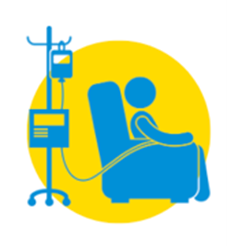
In Partnership with CSL Behring

Life after transplant may look very different from your life now, and it is helpful to prepare for these changes and manage your expectations. Everyone’s transplantation journey is different, and you will experience a lot of uncertainty. With the support of your transplant team, your loved ones and groups such as TransplantLyfe, you can weather this uncertainty and prepare for your post-transplant future. You should always follow the advice of your doctor and your transplant team. A common transplant journey may look something like this, although each person’s journey is different.
Immediately After Transplantation

Immediately after a transplant surgery, a patient should expect to spend several days to a week in the hospital under careful monitoring to watch for signs of transplant rejection or any complications from the surgery. For more information on post-transplant complications, see our article on transplant rejection. Some patients may need temporary dialysis for a few days before their new kidney begins functioning, though for many people, the new kidney will immediately start producing urine. Good nutrition is an important part of recovery and maintenance of a new kidney, particularly right after the surgery. To help heal and recover from the stress of the surgery, your doctor may talk about the importance of consuming enough calories and protein to promote wound healing[1].
The incision site may be sore or painful for patients, which may be normal while healing. The site usually heals within 6 weeks after the surgery. While the wound is healing, your doctor may advise you to avoid lifting heavy objects (10 pounds or more) or exercise strenuously. However, your doctor may recommend that you continue to maintain a level of movement while the wound heals. During this period, you may need to have frequent checkups to adjust your medications and monitor for complications. It may take time and multiple adjustments for you to adapt to your new kidney. It is crucial that you develop a routine for taking your prescribed medications according your doctor’s directions. Some of these medications may need to be taken for the rest of your life to prevent kidney rejection and other complications, such as infection.
Long Term Recovery Post-Transplant Surgery
Around eight weeks after a transplant, transplant patients should be able to resume work, exercise and adopt a regular routine, according to their doctor’s directions. However, there are some long-term adjustments that may need to be made with eating habits in order to preserve the new kidney. Common dietary adjustments the doctor may talk about may include:

- Eating a low-salt, low-fat, high-fiber diet
- Drinking plenty of water
- Avoiding grapefruit (grapefruit can interfere with anti-rejection medications, such as calcineurin inhibitors)
- Extra caution with food safety and eating out (some bacterial infections are picked up from food and can cause complications with your transplant)
Many recipients may develop nutrition-related problems, most commonly weight gain and high cholesterol, which are possible side effects of the transplant medications. It is completely normal, as some of these medications increase an individual’s nutritional needs, and these side effects may be managed with a healthy, balanced eating plan and regular exercise[2]. Often a patient’s transplant team will refer the patient to a dietitian to help tailor a dietary plan.
Regular exercise may also be recommended by healthcare providers to help with medication-related weight gain while boosting a patient’s energy and strength after transplant. Furthermore, exercise may help with common post-transplant complications, such as high blood pressure and high cholesterol. Your transplant team may help design a specific exercise routine.

A couple of months or years out from a transplant, a transplant recipient should have adjusted to their new routine of medications, altered eating habits and exercise. Many recipients report improved quality of life, return to normalcy and improved energy. For some of those who were on dialysis, the relief of not having to frequently attend dialysis clinics and return to a normal living routine has been cited as a great improvement. However, some people may feel declines in energy, health or cognitive function. Furthermore, the burden of medication and frequent checkups may take a toll, and many recipients report anxiety and stress about their transplant. While most recipients overwhelmingly report a sense of freedom, gratitude and improved quality of life, it is important to be cognizant of concerns and burdens that may arise. Transplant support communities such as TransplantLyfe can help relieve these burdens and provide a space to share your concerns throughout the entire transplantation process, including long after the initial surgery.
Keeping A Transplanted Kidney Healthy

One of the most common stressors after transplant is thinking about transplant failure. Fortunately, kidney transplants last on average between 10 to 12 years, and individuals can help protect their transplanted kidney with a healthy lifestyle and regular checkups with their transplant team. Taking care of your mental health may also be important, as stress may affect physical health. Living with uncertainty is a core part of post-transplant life but living with depression or constant anxiety about transplant should not have to be. Individuals may find it helpful to share their concerns in a support group and hear from other transplant recipients who have similar concerns or who have even had a transplant fail. Having social support and knowing they are not alone in this transplant journey can make a huge difference in an individual’s quality of life and their transplant longevity.
Other frequently reported concerns include the transplant’s effect on other diseases, the cost of healthcare, the burden on loved ones and lifestyle changes. It is always important to discuss how your transplant and new routines may affect other diseases, such as diabetes or hypertension with your transplant team and other medical professionals. Fortunately, many of the recommended lifestyle changes for protecting a transplant may also help improve overall health and help protect against other complications.
Normal Life Post Transplantation

After transplant surgery, the transplant will be taking anti-rejection medications for the rest of their life, and will need frequent checkups to monitor the transplanted kidney. The transition after surgery can be difficult, and it may be helpful to turn to friends, family, or a community of like-minded transplant recipients for support and advice. There are many possible complications after a transplant, and the feeling of improved health may be inconsistent as time goes on. It is important for a transplant patient to stick to the routine of medications, healthy eating habits, and exercise as recommended by their doctors, and to be mindful of and report any health changes as they arise. Finally, it may be helpful to prepare their loved ones and the people who are supporting you on the transplant journey ahead of time with any concerns and potential changes that may be expected after transplant[3]. While many recipients focus on the physical aspects of the transplant, the psychological and social aspects may be important to improving a transplant recipient’s quality of life and to protect the transplant.

Your transplant journey is unique to you, and your transplant team will help you create a plan that is tailored to your individual goals and needs, such as creating new eating plan, exercise routine and checkup schedule. As you adjust to your “new normal”, be sure to speak up about changes that don’t work for you, especially with nutrition or exercise. A transplant can be a life-changing event, but it is important to manage your expectations of life after your transplant and lean on your loved ones and social support throughout the ups and downs.
[1] Kidney transplant – Mayo Clinic. Mayoclinic.org. https://www.mayoclinic.org/tests-procedures/kidney-transplant/about/pac-20384777#:~:text=In%20other%20people%2C%20it%20may,within%20eight%20weeks%20after%20transplant. Published 2022. Accessed May 23, 2022.
[2] Martins C, Pecoits-Filho R, Riella MC. Nutrition for the post–renal transplant recipients. Transplantation Proceedings. 2004;36(6):1650-1654. doi:10.1016/j.transproceed.2004.06.065
[3] Tucker, E., Smith, A., Daskin, M., Schapiro, H., Cottrell, S., Gendron, E., Hill-Callahan, P., Leichtman, A., Merion, R., Gill, S. and Maass, K., 2019. Life and expectations post-kidney transplant: a qualitative analysis of recipient responses. BMC Nephrology, 20(1).


